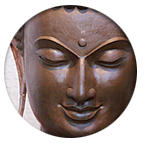In its broadest form, meditation is a universal means of survival. Our minds race constantly, filled with random thoughts and emotions, future plans and past experiences. Without a break from this relentless kaleidoscope we would go crazy. So we find ways to rest. Athletes get into the zone. Musicians plunge into music. Drivers lose a sense of time. Meditation leverages this basic skill to become present in daily life.

 To see Rinpoche discuss how meditation can lead to mental health and happiness, please click here.
To see Rinpoche discuss how meditation can lead to mental health and happiness, please click here.Mindfulness
Mindfulness can be a very good friend, a protective guardian. We may know the problems with anger and hatred and the benefits of loving kindness, but unless we are aware of being angry—what triggered the anger, what we automatically say or do, what the inevitable consequences will be—we won’t put the teachings into practice. This awareness enables us to respond to problems, not just react to them.
 To see Rinpoche explain the “Three Moment Method™,” please click here.
To see Rinpoche explain the “Three Moment Method™,” please click here.Serenity Meditation
Practices for calming the mind are common to many spiritual traditions. Often achieved by breathing exercises or concentrating on an external point of focus, this helps free our minds from petty thoughts and distracting influences. Our minds can rest—not sleep, but simply “be.”
As a result of this practice, we slowly gain concentration. We are not wasting energy touching on many subjects without gaining true understanding of any. Instead, our minds can concentrate all their power on a single subject, in the process building inner alertness, stamina and clarity.
Insight Meditation
Just as a magnifying glass can start a fire, a mind focused on one subject develops wisdom and burns through ignorance. Within Buddhism, the practices that help generate this wisdom are known as insight meditation or vipassana, which literally means seeing extra or superior seeing. Starting from the foundation of a calm, concentrated mind, these analytic meditations include ordered explorations of the body, the mind, and specific aspects of Buddhist teaching. Ultimately, they lead to absolute clarity—enabling us to cut off suffering at its root, by seeing its true nature.

LIVE BETTER
Life is complex, puzzling and often painful.
Sometimes it seems there must be a better way
to manage—and there is. It is as simple as looking
at a problem through a different lens.



